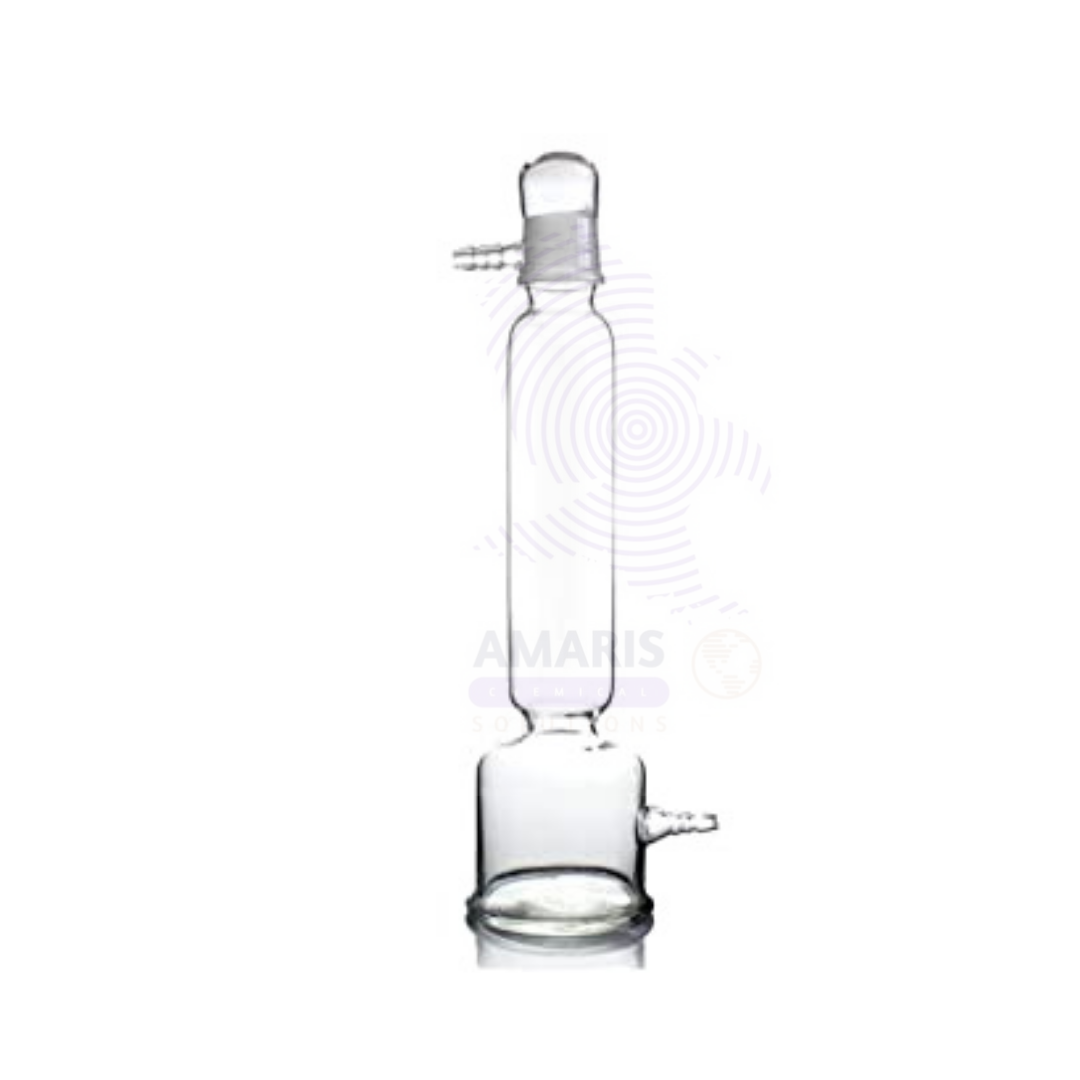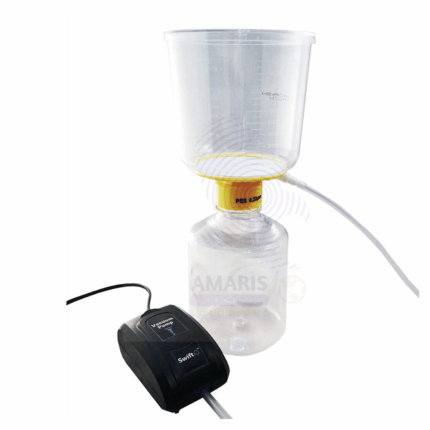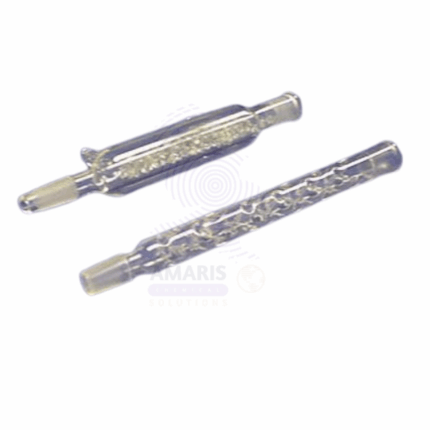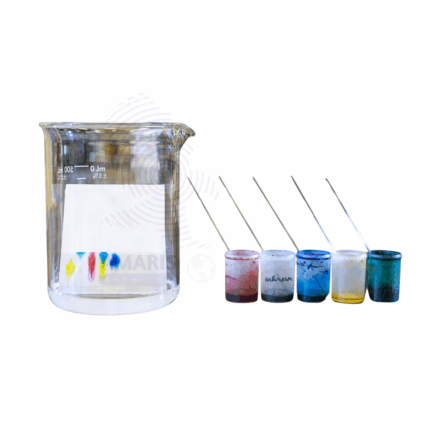![Nickel Sulphate [NiSO4(H2O)6] Extra Pure Amaris Chemicals](https://amarischemicalsolutions.com/wp-content/uploads/2025/08/Nickel-Sulphate-NiSO4H2O6-Extra-Pure-Amaris-Chemicals-150x150.png)
Nickel Sulphate Extra Pure
$ 18.00 Original price was: $ 18.00.$ 17.89Current price is: $ 17.89.

Nicotinamide Extra Pure
$ 17.40 Original price was: $ 17.40.$ 17.34Current price is: $ 17.34.
Drying Tower
$ 38.99 Original price was: $ 38.99.$ 38.71Current price is: $ 38.71.
Whatsapp Order
Drying Tower is a vertical apparatus designed for moisture removal from gases in laboratory and industrial settings. It typically contains desiccants that absorb water vapor to supply dry gases necessary for sensitive chemical processes, gas purification, and environmental applications. Constructed from chemically resistant materials, Drying Towers maintain controlled humidity levels critical for consistent laboratory and industrial operations.
Description
Table of Contents
Toggle
Drying Tower
Primary Uses
- Laboratory gas drying for moisture-sensitive chemical reactions and analyses.
- Supplying dry inert gases such as nitrogen or argon in laboratory environments.
- Preparation of dry air for chromatography and analytical instruments.
- Maintaining dry gas streams to protect moisture-sensitive equipment.
- Use in environmental labs for controlling moisture during gas sampling.
Secondary Uses
- Industrial drying of gases in manufacturing and processing plants.
- Pretreatment of gases for storage in cylinders or pipelines.
- Drying air or gases used in electronics and semiconductor manufacturing.
- Use in research and development for materials requiring dry atmospheres.
- Environmental monitoring applications requiring moisture-free gases.
KEY PRODUCT FEATURES
1.Basic Identification Attributes
- Material: Chemically resistant borosilicate glass or metal (stainless steel/aluminum) construction.
- Contains desiccants such as silica gel, calcium chloride, or molecular sieves.
- Design: Vertical cylindrical tower with inlet and outlet ports.
2.Physical & Chemical Properties
- Resistant to moisture, acids, and bases.
- Durable under gas pressure and temperature variations.
- Transparent or opaque depending on material for process monitoring.
3.Safety & Hazard Attributes
- Desiccants may cause irritation; handle with protective equipment.
- Risk of gas leaks if improperly sealed.
- Fragile glass versions require careful handling.
4.Storage & Handling Attributes
- Store in dry, stable, and ventilated environments.
- Replace or regenerate desiccants regularly to maintain effectiveness.
- Inspect for cracks or damage prior to use.
5.Regulatory & Compliance Attributes
- Manufactured in compliance with laboratory and industrial standards (ISO, ASTM).
- Suitable for use in GMP and GLP certified laboratories and industrial facilities.
6.Environmental & Health Impact
- Glass and metal components are recyclable.
- Proper disposal of spent desiccants to avoid environmental contamination.
- Supports environmentally sustainable processes by reducing moisture-related waste.
SAFETY HANDLING PRECAUTIONS
Safety Handling Precautions
- Use gloves, goggles, and protective clothing when handling desiccants.
- Avoid inhalation of desiccant dust.
- Ensure proper ventilation during operation.
First Aid Measures
- Rinse skin or eyes immediately if contact with desiccants occurs.
- Seek medical advice if irritation or respiratory symptoms persist.
- Treat cuts or injuries from glass carefully and seek medical help if needed.
Firefighting Measures
- Drying Tower materials are non-flammable.
- Use extinguishing agents suitable for surrounding combustible materials.
Related products
Bunsen Burner Nipple
The Bunsen Burner Nipple is a small but essential laboratory component that connects the gas supply tubing to the Bunsen burner. Typically made from brass or other corrosion-resistant metals, the nipple ensures a secure and leak-proof connection between the gas source and the burner, facilitating safe and efficient gas flow for flame ignition. Designed for durability and compatibility with standard laboratory gas hoses, it supports reliable operation during heating and combustion experiments.
Centrifudge Electrical
Centrifudge Electrical, is a laboratory instrument designed to separate components of mixtures based on density by spinning samples at high speeds. Equipped with an electric motor, it offers controlled and consistent centrifugal force, enabling efficient separation of solids from liquids, blood components, or chemical substances. Widely used in medical, research, and industrial laboratories, this device ensures precise sample processing with adjustable speed and timer settings. Its robust design includes safety features such as imbalance detection and secure lids to protect users during operation.
Deionizer Elga Can
Deionizer Elga Can is a compact, high-efficiency water purification cartridge designed for laboratory and industrial use. It contains mixed-bed ion exchange resins that effectively remove dissolved ionic contaminants, producing high-purity deionized water. This unit is ideal for applications requiring ultrapure water free from minerals, salts, and other charged impurities. The Elga Can is designed for easy integration into existing water systems and is widely used in analytical, biochemical, and industrial processes that demand controlled water quality.
Filter Pump
Filter Pump is a laboratory device designed to create a vacuum using water or air flow to assist in filtration processes. Typically made from corrosion-resistant metal, plastic, or a combination of both, it operates by utilizing the Venturi effect to generate negative pressure. This suction power is ideal for accelerating vacuum filtration by drawing liquid through filter media quickly and efficiently. Filter pumps are commonly used in chemical, biological, environmental, and industrial laboratories where rapid and effective liquid-solid separation is required. They are a cost-effective and reliable alternative to mechanical vacuum pumps in many low-to-moderate vacuum applications.
Force Pump
Force Pump is a mechanical device designed to transfer fluids by applying manual force through a piston or plunger mechanism. Unlike lift pumps that only raise liquids to limited heights, force pumps are capable of delivering fluids at higher pressures and over greater vertical distances. Constructed from corrosion-resistant metal or durable plastic, force pumps are widely used in educational demonstrations, physics experiments, and small-scale fluid transfer systems. This apparatus illustrates fundamental hydraulic principles and is essential in laboratories, training workshops, and prototype testing environments.
Fractionating Column
Fractionating Column is a laboratory apparatus used in distillation processes to separate liquid mixtures into their individual components based on differences in boiling points. It consists of a vertical glass or metal tube filled with packing material or internal trays that increase surface area, promoting repeated condensation and vaporization cycles (fractionation). This allows for more efficient separation of close-boiling compounds. Fractionating columns are commonly used in organic chemistry labs, chemical processing industries, and educational institutions. Their design can vary from simple glass tubes to complex industrial towers, but all serve the essential function of improving separation efficiency in distillation systems.
PAPER CHROMATOGRAPHY
Paper Chromatography is an analytical laboratory technique used to separate and identify mixtures of substances based on their differential migration across a specially treated paper medium. It is widely used for qualitative analysis of compounds such as pigments, amino acids, and pharmaceuticals. The process involves applying a small sample spot onto chromatography paper and allowing a solvent to travel through the paper by capillary action, separating the components according to their solubility and affinity for the paper. This method is simple, cost-effective, and valuable in biochemical, pharmaceutical, and environmental laboratories for analyzing complex mixtures.
U Tube Lab Glass With Side Arms
U Tube Lab Glass with Side Arms is a specialized U-shaped borosilicate glass apparatus featuring additional side arms for fluid or gas connections. Designed for laboratory experiments involving pressure measurement, fluid flow, and gas displacement, this device offers enhanced versatility. Made from chemically resistant, durable glass, it withstands temperature fluctuations and chemical exposure. The side arms facilitate easy integration with tubing and other equipment, enabling complex experimental setups in physics, chemistry, and engineering labs. It is widely used in manometer applications, vacuum experiments, and fluid dynamics research.


 Preservatives(food)
Preservatives(food) Flavor Enhancers
Flavor Enhancers Acidulants
Acidulants Sweeteners
Sweeteners Antioxidants
Antioxidants Colorants(food)
Colorants(food) Nutraceutical Ingredients (food)
Nutraceutical Ingredients (food) Nutrient Supplements
Nutrient Supplements Emulsifiers
Emulsifiers
 Collectors
Collectors Dust Suppressants
Dust Suppressants Explosives and Blasting Agents
Explosives and Blasting Agents Flocculants and Coagulants
Flocculants and Coagulants Frothers
Frothers Leaching Agents
Leaching Agents pH Modifiers
pH Modifiers Precious Metal Extraction Agents
Precious Metal Extraction Agents
 Antioxidants(plastic)
Antioxidants(plastic) Colorants (Pigments, Dyes)
Colorants (Pigments, Dyes) Fillers and Reinforcements
Fillers and Reinforcements Flame Retardants
Flame Retardants Monomers
Monomers Plasticizers
Plasticizers Polymerization Initiators
Polymerization Initiators Stabilizers (UV, Heat)
Stabilizers (UV, Heat)
 Antifoaming Agents
Antifoaming Agents Chelating Agents
Chelating Agents Coagulants and Flocculants
Coagulants and Flocculants Corrosion Inhibitors
Corrosion Inhibitors Disinfectants and Biocides
Disinfectants and Biocides Oxidizing Agents
Oxidizing Agents pH Adjusters
pH Adjusters Scale Inhibitors( water)
Scale Inhibitors( water)
 Antioxidants(cosmetic)
Antioxidants(cosmetic) Emollients
Emollients Fragrances and Essential Oils
Fragrances and Essential Oils Humectants
Humectants Preservatives
Preservatives Surfactants(cosmetic)
Surfactants(cosmetic) Thickeners
Thickeners UV Filters
UV Filters
 Fertilizers
Fertilizers Soil Conditioners
Soil Conditioners Plant Growth Regulators
Plant Growth Regulators Animal Feed Additives
Animal Feed Additives Biostimulants
Biostimulants Pesticides (Herbicides, Insecticides, Fungicides)
Pesticides (Herbicides, Insecticides, Fungicides)
 Active Pharmaceutical Ingredients (APIs)
Active Pharmaceutical Ingredients (APIs) Excipients
Excipients Solvents(pharmaceutical)
Solvents(pharmaceutical) Antibiotics
Antibiotics Antiseptics and Disinfectants
Antiseptics and Disinfectants Vaccine Adjuvants
Vaccine Adjuvants Nutraceutical Ingredients (pharmaceutical)
Nutraceutical Ingredients (pharmaceutical) Analgesics & Antipyretics
Analgesics & Antipyretics
 Analytical Reagents
Analytical Reagents Solvents(lab)
Solvents(lab) Chromatography Chemicals
Chromatography Chemicals Spectroscopy Reagents
Spectroscopy Reagents microbiology-and-cell-culture-reagents
microbiology-and-cell-culture-reagents Molecular Biology Reagents
Molecular Biology Reagents Biochemical Reagents
Biochemical Reagents Inorganic and Organic Standards
Inorganic and Organic Standards Laboratory Safety Chemicals
Laboratory Safety Chemicals Specialty Laboratory Chemicals(Special Laboratory Equipment)
Specialty Laboratory Chemicals(Special Laboratory Equipment)
 Demulsifiers
Demulsifiers Hydraulic Fracturing Fluids
Hydraulic Fracturing Fluids Scale Inhibitors(oil)
Scale Inhibitors(oil) Surfactants(oil)
Surfactants(oil) Drilling Fluids
Drilling Fluids
 Dyes and Pigments
Dyes and Pigments Bleaching Agents
Bleaching Agents Softening Agents
Softening Agents Finishing Agents
Finishing Agents Antistatic Agents
Antistatic Agents
 Admixtures
Admixtures Waterproofing Agents
Waterproofing Agents Sealants and Adhesives
Sealants and Adhesives Curing Compounds
Curing Compounds Concrete Repair Chemicals
Concrete Repair Chemicals Anti-Corrosion Coatings
Anti-Corrosion Coatings
 Surfactants(cleaning)
Surfactants(cleaning) Builders
Builders Enzymes
Enzymes Solvents (Cleaning)
Solvents (Cleaning) Fragrances
Fragrances
 Electronic Chemicals
Electronic Chemicals Catalysts
Catalysts Lubricants
Lubricants Photographic Chemicals
Photographic Chemicals Refrigerants
Refrigerants Automotive chemicals
Automotive chemicals Pyrotechnic Chemicals
Pyrotechnic Chemicals
 Biodegradable Surfactants
Biodegradable Surfactants Bio-based Solvents
Bio-based Solvents Renewable Polymers
Renewable Polymers Carbon Capture Chemicals
Carbon Capture Chemicals Wastewater Treatment Chemicals
Wastewater Treatment Chemicals
 Pigments
Pigments Solvents(paint)
Solvents(paint) Specialty Coatings
Specialty Coatings Binders/Resins
Binders/Resins Additives
Additives Driers
Driers Anti-Corrosion Agents
Anti-Corrosion Agents Functional Coatings
Functional Coatings Application-Specific Coatings
Application-Specific Coatings
 Leavening Agents
Leavening Agents Dough Conditioners
Dough Conditioners Flour Treatments
Flour Treatments Fat Replacers
Fat Replacers Decoratives
Decoratives Preservatives(baking)
Preservatives(baking)
 Plasticizers & Softeners
Plasticizers & Softeners Reinforcing Agents
Reinforcing Agents Adhesion Promoters
Adhesion Promoters Vulcanizing Agents
Vulcanizing Agents Antidegradants
Antidegradants Blowing Agents
Blowing Agents Fillers & Extenders
Fillers & Extenders Accelerators & Retarders
Accelerators & Retarders
























